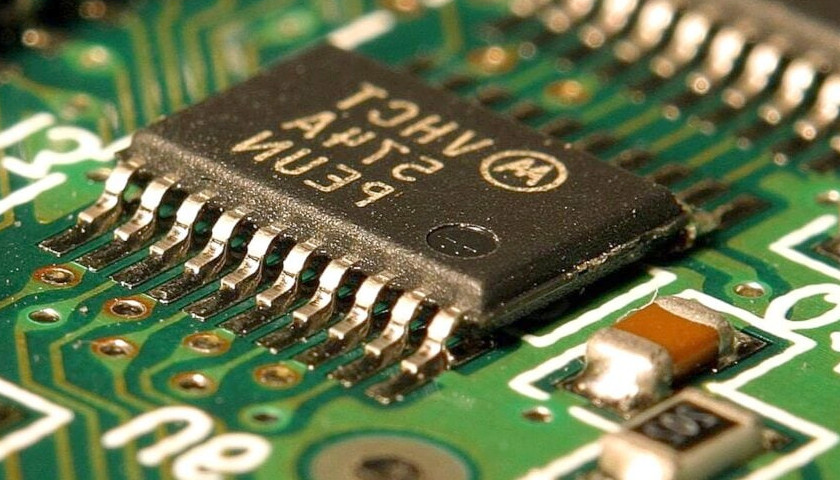by Adeline Von Drehle
China’s rise to rival the United States as a global superpower has been unprecedented. The last war between empires was centered around an arms race, and ended with the U.S. standing strong and solitary atop the world as the Soviet Union fell. But a new race has begun in those 30 years since. China sprinted ahead of the U.S., this time in the field of technology, and aims to stay there. But Congress and the Biden administration have other ideas.
The CHIPS Act, short for Creating Helpful Incentives to Produce Semiconductors, proposes a $52 billion investment in semiconductor production and research. The package also includes a provision which offers a tax credit covering 25% of investments in semiconductor manufacturing through 2026. On Wednesday, the Senate passed the “CHIPS and Science” Act, as Majority Leader Chuck Schumer nicknamed it, on a 64-33 vote. “This is going to go down as one of the major bipartisan achievements of this Congress,” Schumer said.
It’s bipartisan, all right. The question is whether it’s enough to meet the Chinese challenge.
Microchips, another word for semiconductors, are the essential components of all modern technology, omnipresent in everything from smartphones and laptops to ATMs, pickup trucks, and fighter jets – and “nearly every piece of lifesaving medical equipment,” in the words of Commerce Secretary Gina Raimondo. They are “the steel of the 21st century,” added Tom Linebarger, CEO of Cummins, a diesel engine manufacturer.
As of today, the U.S. makes about 12% of the world’s microchips. America is “utterly dependent” on Taiwan for its leading-edge chips, and “totally reliant” on China for its larger chips – those necessary for medical devices, aircraft, and industrial machines – Raimondo pointed out.
She and Linebarger were two of the participants in a virtual roundtable meeting Monday, hosted by President Biden, to discuss the CHIPS Act. Others included Deputy Secretary of Defense Kathleen Hicks, National Security Advisor Jake Sullivan, and various industry CEOs.
This dependence, or “national vulnerability,” as Sullivan put it, stokes fear. The world was reminded by Russia’s invasion of Ukraine earlier this year what can happen if a hostile country – especially one with an abundance of resources – chooses to plug supply chains. The war in Ukraine sent already rising gas prices soaring across the globe. A Russian blockade of around 25 million tons of Ukrainian grain has only just been lifted, though the Turkey- and UN-brokered deal still hangs in the balance. The blockade is the source of a mounting global food crisis.
Dependence on China and Taiwan for microelectronics is even more concerning, argues Sullivan. “Continuing our dependence on a limited number of overseas facilities to produce so many of the chips we consume, including all of our most advanced chips … is flat out dangerous, and a disruption to our chip supply would be catastrophic,” Sullivan explained. “The longer we wait, the more dangerous the disruption.”
As of today, microelectronics make up 0.7% of GDP in the U.S., but 16% of GDP in China. Secretary Hicks explained that approximately 98% of the commercial microelectronics at the Department of Defense are assembled, packaged and tested in Asia. “It is not an overstatement to say,” in the words of Secretary Hicks, that “semiconductors are on the ground zero of our tech competition with China.”
Sullivan warned that dependence on foreign microelectronics could be the basis of a shift in the global order. “For the first time, we face a competitor that has the means, the resources, and the commitment to overtaking U.S. technological leadership” if America does not soon make “the necessary investments.”
The purpose of Monday’s meeting was two-fold, with national security being the first topic of importance. Jim Taiclet, CEO of Lockheed Martin, explained the necessity of microprocessors in weapons manufacturing. In the eyes of the armament titan, the U.S. needs both “confidence in the security of the hardware itself, that it hasn’t been tampered with or degraded” as well as “access to the latest cutting edge technologies … because they are the building blocks of the defense systems of the future.”
Each state-of-the-art missile requires 250 microprocessors. Helicopters such as the CH-53K use up 2000 microprocessors a pop. From fighter jets to nuclear weapons, microelectronics are integral to national defense, which is why “it is important and urgent to begin to rebuild U.S. semiconductor chip manufacturing,” said Taiclet.
Semiconductors are also vital to the medical and industrial sectors, as argued by Linebarger and Geoff Martha, CEO of the healthcare technology company Medtronic. Both sectors currently face a limited supply of semiconductors. Martha argues the supply chain crisis is causing “ongoing disruptions to patient care” in the medical field. Linebarger explains the “shortage has not only impacted our ability to meet customer demand, but the technology and equipment we need to run our operations.”
The powerful roundtable further discussed the economic importance of microelectronics. “The country that is able to be leading the world in … artificial intelligence, quantum computing, biotechnology, the future of the internet, and the future of telecommunications” will have “economic competitiveness that will be reflected in job creation and growth of a strong middle class,” said Sullivan.
“The reality is, it’s not possible to have a strong economy and a strong country if we don’t make things in America, and certainly if we don’t make chips in America,” said Raimondo. The hope is that passage of the CHIPS Act will serve as an investment into the country and its workers, stoking American competitiveness and unlocking American ingenuity. As Martha put it, “the investment will spur innovation.”
The politics of fear prove powerful across the spectrum. Biden has urged Congress to “pass this bill as soon as possible.” Senate passage Wednesday afternoon means that the package is halfway there. The measure now goes to the House. Addressing the nation Wednesday, Biden put it plainly: the CHIPS Act “is good news for America.”
– – –
Adeline Von Drehle is a rising senior at the University of Missouri studying American history. She will spend the coming year as an Oxford fellow at Corpus Christi College.






Baloney!